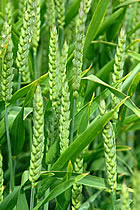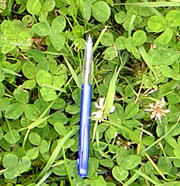| |
Plant Testing Services
We offer the following levels of plant tests.
Basic Plant (BP)
This "basic" test provides an overview of the main nutrients significant for the healthy growth of most plants. Parameters assessed are: Nitrogen, Phosphorus, Potassium, Sulphur, Calcium, Magnesium, Sodium as well as the important trace elements Boron, Iron, Manganese, Copper and Zinc.
Additional analyses can be carried out for specialist crops:
BP + Molybdenum - Clovers, Brassicas
BP + Nitrate N - Grapes, other tree crops
BP + Chloride - Avocado, Kiwifruit etc
Mixed Pasture (MP)
This test incorporates the components of the Basic Plant test but also includes three additional trace elements: Cobalt, Selenium and Molybdenum. It is therefore a usual generalised test to assess plant nutrient levels of most crops as well as indicating whether stock grazing the plants will receive adequate Cobalt and Selenium.
Full Pasture (FP)
This test is identical to the Mixed Pasture test but also incorporates one additional trace element: Iodine. The latter is vital to stock health and well-being, particularly at certain times of the year.
Pasture Full Feed Profile (FPFP)
This test analyses the same nutrient regime as the Full Pasture test but also incorporates several important feed quality parameters: Dry Matter, Crude Protein, Acid Detergent Fibre, Neutral Detergent Fibre, Soluble Sugars, Metabolisable Energy and Digestibility.
Animal Dietary Mineral Balance (ADMB)
Where animals are grazing the plants sampled in any of the above plant tests, a useful complementary addition is the ADMB report. Whereas the plant tests essentially indicate the adequacy of nutrients with regard to plant requirements, the ADMB takes things a step further and assesses whether the nutrient levels in the plant are adequate in terms of the nutrient requirements of the particular animal grazing that foliage.
Other Tests
In addition to the tests listed, we also test for a range of other different plant parameters, including analysis of the plant sap.
View Sap Test Results in tabular format »
View Sap Test Results in graphic format »
Why Plant Test? The answer to the above question is better understood in the light of the following question:
Why do we fertilise?
A soil test indicates the ability of a soil to supply nutrients to growing plants in the medium term. A plant test, on the other hand, gives a more or less instant indication of the adequacy of nutrients for plant growth i.e. no calibration or correlation is required, the adequacy of nutrient supply is assessed directly from the plant. Because a plant test enables a short term assessment of nutrient supply, it enables growers to make possible fertiliser refinements or modifications. In the case of forage crops, where nutrient supply for animal health is paramount, a plant test gives an accurate indication of the plants ability to supply essential nutrients to the animal. Further information on plant nutrient levels can also be furnished from a sap analysis which gives an even more direct handle on the actual nutrient being taken up into the plant at any given time.
Soil and plant tests complement one another. Analysis of plant leaf tissue may identify that there is a nutrient supply problem but tells nothing as to its cause. On the other hand, a soil test will help to provide answers as to a likely cause. Thus in many situations - visual symptoms in the leaves, stock not doing as well as expected, - a plant test will identify the problem and, if a recent soil test is available from the same area, the soil test will help to determine the cause of the problem and provide information to help to rectify what is wrong
Plant tests complement the soil tests, usually providing a more reliable indication of plant/crop nutrient status than is possible from the soil test on its own. However, if there are no plants growing or the plant is dormant, a soil test may be required.
Thus, the best way to get good information is usually obtained from a range of different tests:
- Plant tests usually give an accurate assessment of nutrient levels
- Soil tests indicates whether nutrient reserves are adequate and an indication of likely causes of plant deficiencies
- Microbial tesst indicate the condition, health and levels of soil biology which are the drivers of nutrient supply and re-cycling.
[ Return to top of page . . ]
|
|



